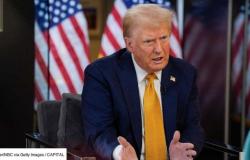– Advertisement –
January 7, 2025 marks a turning point in French political history with the disappearance of Jean-Marie Le Pen, a key figure of the radical right and nationalism in France. Former president of the National Front, which became the National Rally under the leadership of his daughter Marine, Le Pen left his mark on France for more than five decades with his often controversial positions and his vision of the world radically opposed to the establishment. But what does the disappearance of this character mean for Lebanon? What echoes can his departure generate in the country of Cedar, where geopolitical issues and relations with France are more relevant than ever?
Jean-Marie Le Pen has often mentioned Lebanon, in particular through his nationalist prism and his concerns linked to Franco-Lebanese relations, the geopolitical issues of the Middle East and the position of France in this region. Here are some key moments when he spoke about Lebanon:
The Lebanese Civil War (1975-1990)
Jean-Marie Le Pen closely followed events in Lebanon during the civil war, notably through his defense of Lebanese Christians, notably the Maronites, who were perceived by Le Pen as defenders of the West in the face of the expansion of the Islamic radicalism. Le Pen expressed concerns about the growing influence of Islamist movements in Lebanon and the need for France, as a former mandatory power, to intervene or provide support to Christian factions, particularly during the 1980s. , when France played a role in ceasefire negotiations and efforts to stabilize the region.
Position on Israel and Hezbollah
Over the years, Le Pen has addressed the Israeli-Palestinian conflict and issues related to the presence of Hezbollah in Lebanon. In his speeches, he often highlighted criticism of Iranian influence in Lebanon and Hezbollah’s role as a terrorist group, while adopting a pro-Israeli stance, a position which did not go unnoticed in Lebanon. This position was sometimes out of step with certain Lebanese factions, notably those close to Syria or Iran.
Position on Syria and Iran
Regarding Syria and Iran, two key countries in the Middle East, Jean-Marie Le Pen has taken positions that have diverged from those of the majority of Western countries, including France under other governments. Although he has not openly supported these regimes, he has sometimes expressed a form of skepticism regarding international sanctions against these countries. Le Pen was not particularly hostile to Iran, but he rejected the idea of war against the country, preferring a negotiation approach. This could be interpreted as a more neutral stance compared to the West’s more hostile attitude towards Iran.
France’s position in Lebanon
Jean-Marie Le Pen also commented on France’s policy towards Lebanon, particularly in terms of support for the various Lebanese political factions. He often criticized the position of France which, according to him, did not sufficiently defend French and European interests in Lebanon, particularly in the face of interference from external powers such as Iran or Syria. He advocated a more assertive and independent position on the part of France in its relations with Lebanon, particularly in the context of the management of relations with the Arab and Islamic world.
France’s role in the reconstruction of Lebanon after 2005
After the assassination of former Lebanese Prime Minister Rafic Hariri in 2005, Jean-Marie Le Pen took a position on France’s role in Lebanon’s reconstruction process. He expressed opinions on whether France should play a more active role in supporting Lebanon’s reconstruction, but also be firmer against foreign influences that he believed were compromising Lebanese sovereignty.
Lebanon in the context of Franco-Arab relations
In his public interventions, Jean-Marie Le Pen has often stressed the importance of relations between France and the Arab world, including Lebanon. He advocated for a more independent foreign policy, particularly regarding relations with the Muslim world. Le Pen has regularly discussed Lebanon in this context, emphasizing the complexity of relations between the different Lebanese confessional groups and regional powers, notably Syria and Iran.
The question of immigration in France and Lebanon: a similar analysis of the societal impact
Jean-Marie Le Pen has often stressed that immigration, whether from Africa, the Middle East or Asia, constitutes a threat to national identity and social cohesion in France. He advocated a strict policy of controlling immigration and giving priority to French people of origin. He frequently compared immigration in France to that which he perceived as being a weakening factor for Western societies in general, including Lebanon. Lebanon, being a small country with a relatively small population compared to the diversity of its refugees and immigrants (notably Syrian, Palestinian and Iraqi), offers an interesting field of analysis for Le Pen who often compared the management of this emigration to the situation in France.
Indeed, just like France, Lebanon has had to face massive waves of migration, whether due to regional conflicts or internal crises. Le Pen has, on several occasions, highlighted the way in which uncontrolled immigration could exacerbate internal tensions, both in France and in Lebanon. However, while France faced economic migrants or war refugees, Lebanon had to manage communities of permanent refugees, notably Palestinian and Syrian, on its own territory.
Lebanese emigrants in France: a parallel between reception and reintegration
Jean-Marie Le Pen also addressed the issue of Lebanese emigration to France, particularly at the beginning of the 20th century and during the years of civil war (1975-1990). For Le Pen, Lebanese immigration to France was often seen in a positive light, as a community of Christian origin, sharing common values with French identity. The Lebanese in the diaspora, particularly those of Maronite Christian origin, have indeed been perceived as a relatively well-integrated group, especially in the 1980s and 1990s, and contributing to the French economy and culture. Le Pen sometimes referred to this group of emigrants as an emigration that managed to preserve a strong cultural identity while integrating into the French social fabric.
However, Jean-Marie Le Pen’s speech on immigration to France also echoed his broader rejection of immigration from Muslim countries, particularly due to geopolitical conflicts in the Middle East. As such, he often warned against what he perceived as a double standard in the treatment of refugees, where certain communities, such as Syrians or Palestinians, were perceived differently compared to emigrant Lebanese, whom he considered better integrated into French society.
The risks of communitarianism: Le Pen and the comparison of Lebanese communities in France and Lebanon
Le Pen also highlighted the risks of communitarianism, both in France and in Lebanon, stressing that mass immigration could lead to distinct cultural enclaves, internal conflicts, or even the destabilization of society. He criticized the idea of multiculturalism, which he considered incompatible with French national identity. This vision could also be applied to Lebanon, where the coexistence of multiple confessional groups – Christians, Sunni and Shiite Muslims, Druze – made true national unity difficult, just as he perceived similar tensions in France, where the question of Integration of immigrants, particularly those from Muslim-majority countries, was often on the table.
Le Pen, when discussing the Lebanese situation, sometimes insisted on the dangers of being too open to refugees, pointing out the risk that these migratory waves could reinforce social and community divisions in the country. For him, both France and Lebanon should be wary of the increase in these homogeneous communities which, according to him, risk eroding social cohesion and hindering integration.
– Advertisement –






